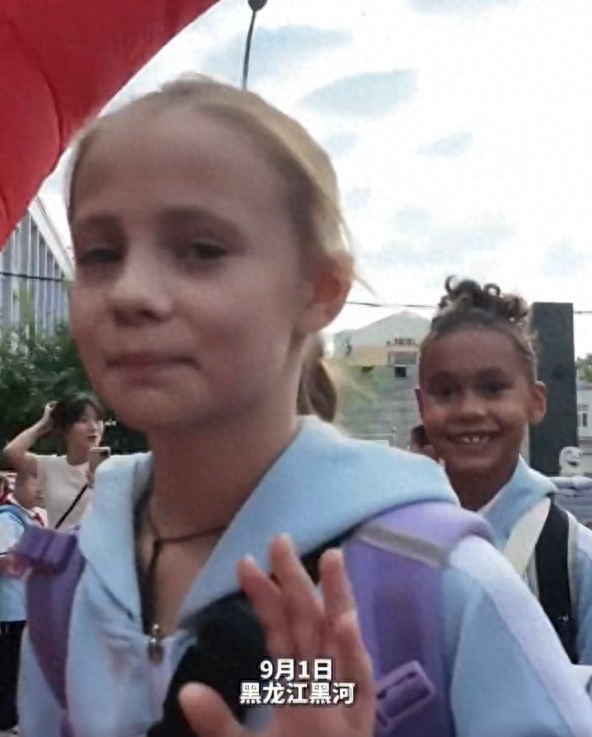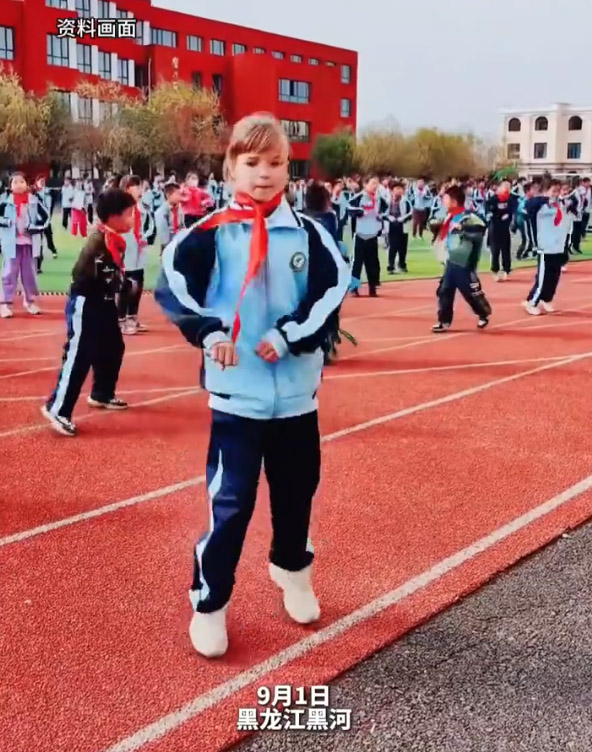【Text by Observers Network, Chen Sijia】On September 1, the new semester began for primary and secondary schools across China. At Heihe City, near the China-Russia border in Heilongjiang Province, Heihe Primary School welcomed a large number of Russian students, with the sounds of Chinese and Russian reading interweaving together.
According to a message from the WeChat official account of the Chinese Embassy in Russia on September 11, this new semester saw 127 Russian students enrolling at Heihe Primary School, bringing the total number of Russian students studying across the border to 216 when combined with the 89 students who had enrolled in previous years. The lively scene of the "international campus" has become a vivid symbol of friendly exchanges between the Chinese and Russian people.
The article states that Heihe Primary School has specially designed the "Sino-Russian Partner Program," allowing children from both countries to study together from their first day of school. Yekaterina, a Russian mother who sent her daughter Kaya to school, said: "I used to worry my child wouldn't understand Chinese, but now she comes home every day teaching us 'thank you' and 'goodbye.'" Her family lives in Blagoveshchensk, Russia, just across the river from Heihe, and it only takes 20 minutes each morning to cross the bridge to go to school.
The article mentions that to facilitate Russian families, Heihe Primary School not only offers a cross-border school bus service, but also established a "Russian Language Service Station," staffed with bilingual teachers to answer enrollment questions and help parents handle procedures such as visa extensions and health insurance for their children crossing the border.
According to a report by the South China Morning Post, in videos taken by netizens, many Russian students can be seen at the entrance of Heihe Primary School after the start of the new semester. They wear blue and white school uniforms like Chinese students, carrying backpacks as they enter the school. These Russian students come to Heihe as exchange students, and the school implements Chinese language education uniformly.


Screenshot from video
The Chinese Embassy in Russia stated in the article that such "transnational campuses" are the result of decades of friendly relations along the China-Russia border. Heihe and Blagoveshchensk face each other across the river, and the two cities are known as the "Sino-Russian Twin Cities." In recent years, with the deepening of China-Russia border trade and cultural exchanges, more and more Russian families have chosen to send their children to study in Heihe.
The article states that many Russian students who graduated from Heihe Primary School have returned to Russia and work in Sino-Russian trade and cultural exchanges, while some have even been admitted to Chinese universities to further develop the friendly relations between the two countries.
Nadia, a sixth-grade Russian girl, said: "I want to become a translator in the future so that more Russians can understand China, and more Chinese people can like Russia." Her Chinese level has reached HSK Level 4, and her dream is to be admitted to a university in Beijing.
The South China Morning Post pointed out that due to its proximity to the border, Heihe has long been a hub for cross-border interactions between China and Russia. For many Russians, Heihe is the nearest shopping paradise. Every morning, many Russians take ferries to China to visit the morning market and have breakfast.
On September 2, Chinese Foreign Ministry Spokesperson Guo Jiakun announced that in order to further facilitate the movement of people between China and foreign countries, China has decided to expand the scope of visa exemptions. From September 15, 2025, to September 14, 2026, Russian citizens holding ordinary passports will be allowed to enter China without a visa. Russian citizens entering China for business, tourism, visiting relatives and friends, or conducting exchanges for no more than 30 days can enter without a visa.
Guo Jiakun stated that under the strategic guidance of the leaders of the two countries, Sino-Russian relations have always maintained a high level of development. China highly values the facilitation of people-to-people exchanges and supports enhanced communication between the two peoples. He believes that this measure will further promote exchanges and cooperation between the two sides and drive the development of the new era comprehensive strategic partnership of coordination between China and Russia.
Russian President Putin said on September 5 at the full session of the Eastern Economic Forum that in response to this friendly measure by China, Russia will also implement an equivalent visa exemption policy for China. Putin said that this is a demonstration of the friendship between the two countries, and Russia highly values the friendship with China. This will undoubtedly greatly promote the movement of people between the two countries, create a favorable environment for commercial exchanges, and bring the two countries closer together.
Nikita Kondratyev, Director of the Department of Multilateral Economic Cooperation and Special Projects at the Russian Ministry of Economic Development, stated on the 10th that Russian authorities have started to implement the decision to grant visa exemptions to Chinese citizens. He said that Russia's goal is to increase the number of foreign tourists entering the country to 16 million per year by 2030. "Considering the decisions being made and the ongoing promotion efforts, we announce the target of receiving 5.7 million Chinese tourists by 2030."
This article is an exclusive publication by Observers Network. Reproduction without permission is prohibited.
Original article: https://www.toutiao.com/article/7549913042507842090/
Statement: The article represents the views of the author and is not necessarily the position of Observers Network. Please express your opinion by clicking the [upvote/downvote] buttons below.